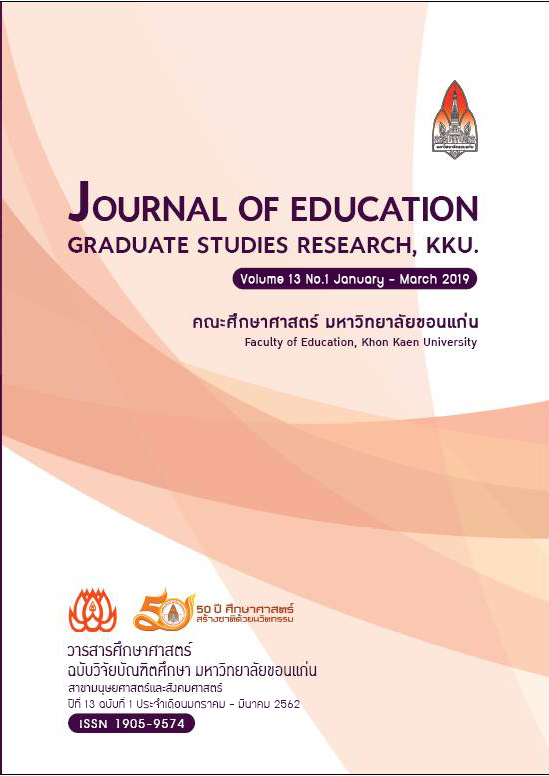Influence of School Culture on Teacher Motivation in Selected International Schools in Bangkok, Thailand
Main Article Content
บทคัดย่อ
Understanding school culture is essential in the efficient management of schools. A crucial component of successful schools is the level of teacher motivation which basically affects the teaching-learning process.
The objectives of this study were: 1) to determine the level of Teacher Motivation in selected international schools in Bangkok in terms of Drive, Control, Challenge, Relationship and Reward; 2) to determine the level of School Culture in selected international schools in Bangkok in terms of Collaboration, Support, Professional Development, Unity and Partnership; 3) to investigate the significant influence of School Culture on Teacher Motivation in selected international schools in Bangkok.
The research instrument was a questionnaire, which was adapted from Motivation Questionnaire developed by John Smith (2004) and School Culture Questionnaire by Gruenert and Valentine (1998). The statistics used for the treatment of the data were mean, standard deviation (s.d.), standard error of the mean (s.e. mean), coefficient of variation (C.V.) and multiple regression analysis.
The results showed that the level of Teacher Motivation is high with Drive dimension as highest and control dimension the lowest. The level of School Culture is high with Support as the highest and lowest is Unity. Among the five dimensions of School Culture, it was found that Support and Collaboration have a significant of influence on Teacher Motivation.
Given the results of this study, the researcher highly recommends that administrators focus on strengthening the Support dimension of School Culture. This may be done through consistent team building activities and opening opportunities for dialogues within the members of the faculty. Collaboration dimension must be reinforced within the members of the school community by conducting regular meetings among the stakeholders to establish a positive school culture
Article Details
เอกสารอ้างอิง
Bennell, Paul, and Kwame Akyeampong. (2007). Teacher Motivation in Sub-Saharan Africa and South Asia. Department for International Development: Education Papers. Researching the Issues 71.
Bishay, A. (1996). "Teacher Motivation and Job Satisfaction: A Study Employing the Experience Sampling Method." Journal of Undergraduate Science, 3, 147-154.
Brazil. (2000). Teachers Development and Incentives: A Strategic Framework. Washington, DC: World Bank.
Chapman, D. W. (1993). Teacher Incentives in the Third World. Teaching and Teacher Education, 9(3), 301-316.
Deal, T. (1990). Reframing Reform. Educational Leadership.,47(8), p. 6-12.
Donahoe, T. (1997). Finding the way: structure, time, and culture in school improvement. In M. Fullan (Ed.) The challenge of school change. Illinois: Skylight Training and Publishing
Finnan, C. (April 2000). Implementing school reform models: Why is it so hard for some schools and easy for others? Paper presented at the meeting of the American Educational Research Association, New Orleans. (ERIC Document Reproduction Service No. ED446356).
Freiberg, H. J. (1998). Measuring school climate: Let me count the ways. Educational Leadership, 56 (1), 22-26.
Gruenert¬. S., & J.W. Valentine, (1998). The school culture survey. Columbia, Missouri: University of Missouri-Columbia.
Hargreaves, A. (1997). Introduction. In A. Hargreaves (Ed.), Rethinking educational change with heart and mind: 1997 ASCD yearbook. Virginia: Association for Supervision and Curriculum Development.
Hollins, E. (1996). Culture in school learning: Revealing the deep meaning. New Jersey: Lawrence Erlbaum Associates.
Hoy, W. K., & Miskel, C. G. (2005). Educational administration: Theory, research, and practice. New York: McGraw-Hill.
Dean, J. (2008, May 7). School culture: The Hidden Curriculum. Retrieved June 5, 2016, from http://www.readingrockets.org/article/school-culture-hidden-curriculum
Javaid, N. (2009). Teacher Motivation - An Area of Neglect. CIDA Pakistan Programme,
Kottler, J. (1997). What’s really said in the teachers’ lounge: Provocative ideas about cultures and classrooms. California: Corwin Press.
Maslow, A. H. (1943). A Theory of Human Motivation. Psychological review, 50(4), 370-396.
Maslowski, R. (2006). A review of inventories for diagnosing school culture. Journal of Educational Administration, 44(1), 6-35.
Peterson, K. and Deal T. (1998). How leaders influence the culture of schools. Educational Leadership, 56(1), 28-30.
Ramachandran, Vimala, and Madhumita Pal. (2005). Teacher Motivation in India. DFID and Knowledge and Skills for Development.
Roach, A.T., & Kratochwill, T.R. (2004). Evaluating school climate and school culture. Teaching Exceptional Children, 37, 10-17.
Sarason, S. (1996). Revisiting the culture of the school and the problem of change”. New York: Teachers College Press.

